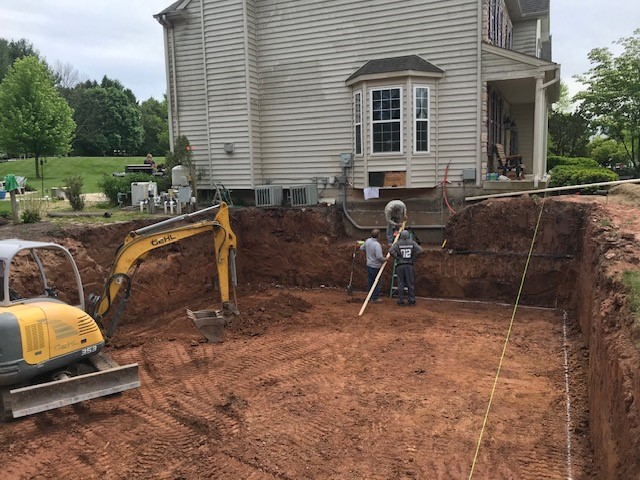Tripp Excavation provides a wide range of services related to earthwork and excavation. Here are some typical excavation services we provide and have already done over the years for our clients.
Site Preparation
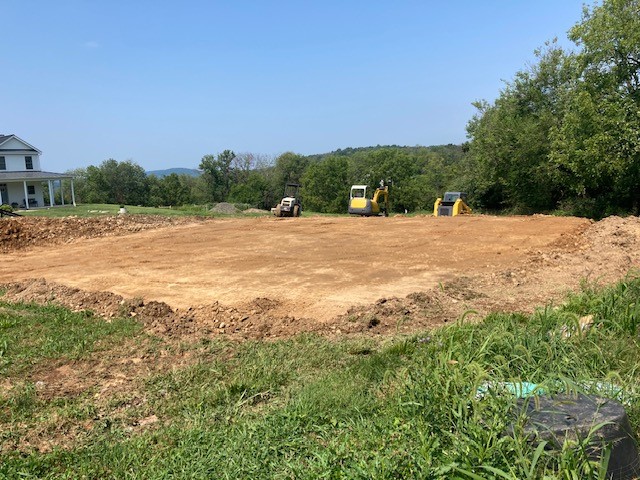
Site preparation is a critical phase in any construction or development project, as it sets the stage for the successful execution of the entire endeavor, and plays a pivotal role in this process by providing comprehensive site preparation services.
- Clearing and Vegetation Removal: We begin by clearing the site of any existing vegetation, including trees, shrubs, grass, and bushes. This step is necessary to create a clean, open space for construction activities. Clearing also involves removing any debris or organic material that may obstruct construction.
- Demolition: If there are existing structures on the site that need to be removed, we can undertake demolition work. This can involve tearing down buildings, breaking up concrete or asphalt, and safely disposing of debris. Demolition may also include the removal of old foundations or structures that are no longer needed.
- Grading and Leveling: After clearing and demolition, the site must be properly graded and leveled. Grading involves reshaping the land to achieve the desired slope, elevation, and contour. Proper grading ensures that water drainage is managed effectively, preventing issues like flooding or erosion.
- Excavation for Foundations: Depending on the construction project, trenches and foundations are often required for proper footing of any structure. This involves carefully excavating the ground to the specified depth and dimensions required for the building’s foundation. Precise measurements and excavation are crucial to ensure a stable and safe foundation for the structure.
- Utility Marking and Protection: Before excavation, we will coordinate with utility companies to locate and mark the positions of underground utilities such as gas lines, water pipes, and electrical cables. This step is critical to prevent accidental damage to utilities during excavation.
- Erosion Control: To prevent soil erosion during and after construction, erosion control measures are put in place. These measures may include silt fences, erosion control blankets, and sediment basins to manage stormwater runoff and protect nearby water bodies.
- Environmental Considerations: In some cases, site preparation may involve environmental remediation efforts, such as soil cleanup or the removal of hazardous materials. These activities are crucial for compliance with environmental regulations and ensuring the safety of the site. We can help guide you with the correct steps.
- Site Cleanup: Once site preparation is complete, we clean up the area, removing any remaining debris, excess soil, or construction waste. This leaves a clean and safe environment for subsequent construction phases.
Trenching
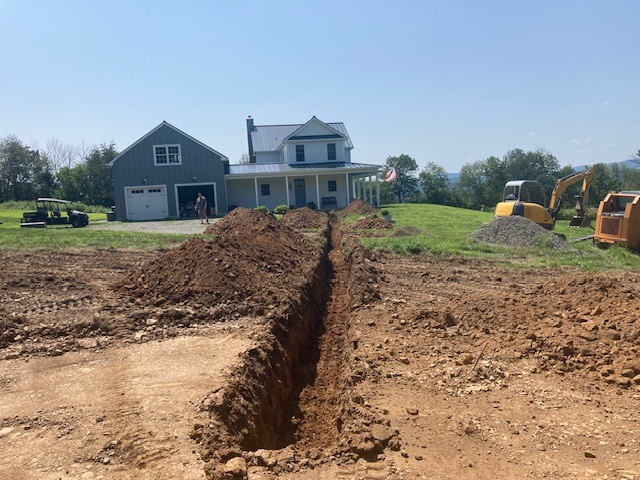
Trenching is a crucial excavation service that involves digging narrow, deep channels or trenches in the ground for various purposes.
- Utility Installation or Repairs: Trenching is commonly used to install or repair underground utilities such as water pipes, sewer lines, gas pipelines, and electrical conduits. We dig trenches to the required depth and dimensions to accommodate these essential services, ensuring they are safely concealed below the ground.
- Foundation Footings Installed or Repaired: Trenches are excavated to create or repair the foundation footings for buildings and structures. These trenches provide the necessary depth and support for the foundation walls, ensuring the stability and durability of the entire structure.
- Drainage and French Drains: Trenches are utilized to create drainage systems, including French drains, which are designed to redirect groundwater away from a specific area, preventing flooding or water damage.
- Geological Surveys: In geological research or exploration, trenching may be used to expose geological strata for examination. These trenches provide valuable insights into the earth’s history and composition.
Basement Excavation
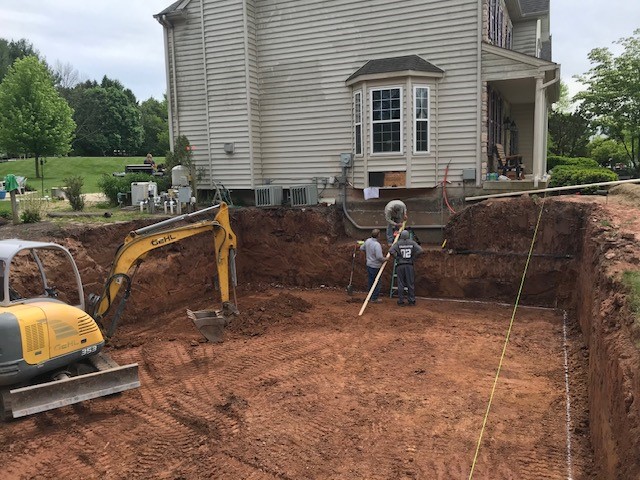
This excavation process typically requires careful planning, experience, and high-precision to ensure structural integrity and proper waterproofing to prevent moisture intrusion. Basements offer you valuable square footage and provide versatility and functionality, whether as living spaces, recreational areas, or storage facilities, making it a valuable addition to both residential and commercial structures.
Land Grading
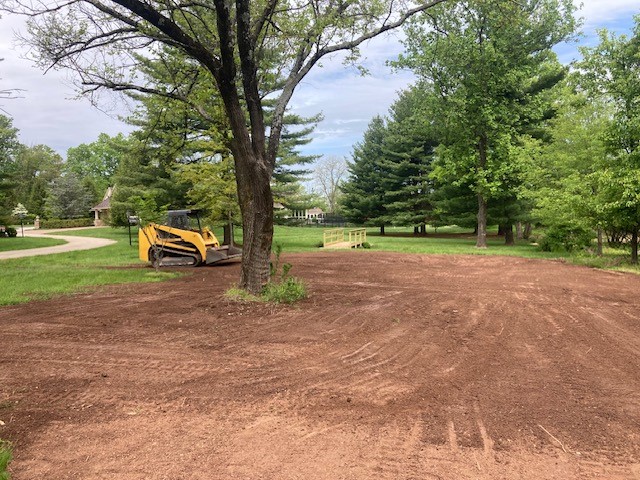
Land grading is a construction and landscaping process that involves reshaping the terrain to create a level or sloped surface that meets specific design requirements. This essential task ensures proper drainage, facilitates construction, and enhances the aesthetics and functionality of a property. During grading, heavy machinery, such as bulldozers and graders, is used to remove high spots, fill in low areas, create ponds or other water structures, backfilling, and create the desired contours. Proper land grading helps prevent issues like erosion, standing water, and uneven surfaces, making it a critical step in site preparation for various projects, including building construction, road development, and landscaping.
Retaining Wall Installation
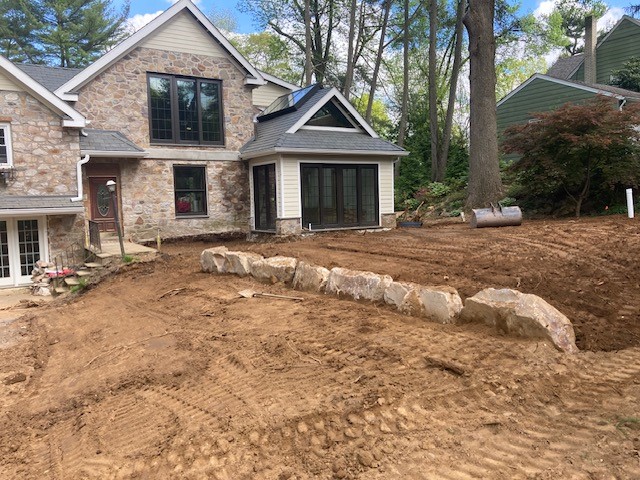
Rock retaining walls offer several benefits in landscaping and construction:
- Erosion Control: Retaining walls made of rocks can effectively prevent soil erosion on slopes and hillsides by stabilizing the ground and reducing runoff.
- Aesthetic Appeal: Natural stone or rock retaining walls add a visually appealing and rustic element to outdoor spaces, enhancing the overall landscaping design.
- Structural Support: They provide structural support by holding back soil and preventing landslides or slippage, making them crucial for hilly or uneven terrain.
- Versatility: Rock retaining walls are versatile and can be customized to fit various heights, shapes, and styles, allowing for creative landscaping solutions.
- Durability: Natural stone is long-lasting and can withstand the elements, making rock retaining walls a durable and low-maintenance option.
- Property Value: Well-constructed rock retaining walls can increase property value by improving functionality and aesthetics while addressing potential erosion issues.
Excavation Equipment We Use
Bobcat
Bobcat excavating services involve the use of a compact skid-steer loader to perform excavation tasks. It’s a versatile machine suitable for various digging and earthmoving applications.
Skidloader
Skidloader excavation services utilize a skid loader or skid-steer loader for digging and moving soil. Skidloaders are known for their agility and maneuverability in tight spaces.
Backhoe
Backhoe excavation services make use of a backhoe, a heavy equipment machine with a digging bucket on one end and a digging arm on the other. Backhoes are ideal for deep digging and trenching.
Mini Excavator
Mini excavators are compact, versatile machines that perform excavation in confined spaces. They are suitable for smaller excavation projects where precision is required.

